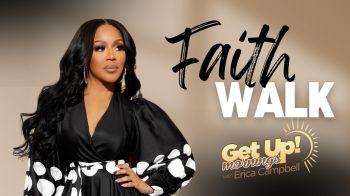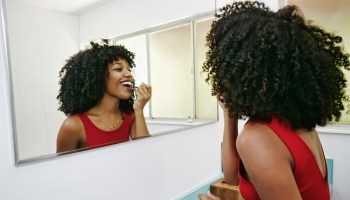Ami Colé Closing Proves Visibility Doesn’t Equal Viability

Ami Colé is shutting down. Founder of the beloved makeup brand, Diarrha N’Diaye-Mbaye, announced this week, that the brand won’t be providing perfect shade matches or slick lips anymore. In an essay for The Cut, N’Diaye-Mbaye explained the challenges her company had experienced and why she was ceasing operations. The news shocked beauty enthusiasts who swore by the company’s quality formulas.
N’Diaye-Mbaye hit every beauty founder milestone. With more experience than most, she had the blueprint. She appeared in top-tier publications, an stole the hearts of celebs and influencers. She started the lip oil craze and made it to department store shelves. Yet, those wins did not save the company.
Her essay represented the dichotomy between being seen and being sustained. Black women in business feel that gap deeply.
Skin care educator, beauty influencer, and author Felicia Walker felt her heart break when she heard.
“It never gave shabby. It never gave falling apart. The brand, and the creator, is literally a perfect test case and it is failing, and that just erupts my soul,” she said. Walker receives thousands of dollars of gratis beauty products weekly but sinks her own money into Ami Colé because she loves the line so much.
“I buy the product,” she said. “I’m actually a true consumer.” Walker expressed frustration in the wake of firm commitments to Black brands wavering. In some cases announcements of commitments to providing capital are very loud and whispers about the lack of follow through found in those strategic partnerships are a bit more quiet.
“Money gets thrown at things to check off boxes, but there is no true interest investment or long-term planning,” she said. “They give you the appearance of being in alignment with what’s right.”
Being Forced To Bridge The Gap
Steep funding gaps and institutional challenges present difficulties for even the most visible brands. Black firms receive less venture capital investment and, in some cases, less time in which to capitalize on it.
“We are not given the same runway,” said Goldman Sachs One Million Black Women Black in Business Advisor and Brown Girl Marketing Founder Ylorie Taylor.
The beauty industry is not the only place where visibility does not lead to viability. Many of the biggest names in the creator economy have revealed that their views and shares don’t necessarily translate into sustainable income.
Taylor recalled the hollow commitments made to companies in the wake of George Floyd’s 2020 murder. “It gave us rose colored glasses. It looked really pretty. The money was coming to the right companies at the right time,” she said. “We relied on it, depended on it, included it in our marketing plans, our strategic outlook, our financial outlook and then it dried up.”
Investors decide the fate of many companies. “It all depends on the investor and everyone’s contract with their investor is different,” said celebrity makeup artist and agency owner Keanda Vivar.
Building…And Unbuilding In Public
Brands closed in private previously. Today, they’re walking the public through their detours, roadblocks, and redirections. “To every Brown girl out there, don’t be afraid to fail out loud. Take it there! Dare to dream big! Learn, dust your self and try again. Pay it forward,” wrote N’Diaye-Mbaye in an instagram caption.
This level of transparency is rare according to Vivar. “As a Black woman, you only talk about your struggle when it really hits the fan,” she told HelloBeautiful. Knowing that founders, creators and influencers who become recognizable still face issues scaling can help empower future creatives. They learn what success is from this, not just what they thought it would look like.
Vivar recommended Ami Colé to multiple clients who trusted her expert opinion. She knew sales were important to sustain one of her favorite companies. “Visibility definitely helps but it doesn’t always equate to you being successful in your business,” she continued.
“I know so many people that they have a brand that they’re keeping afloat, and people don’t know that they’re still working a nine to five. They’re living in their mother’s basement. They’ve sold everything that they have, but their brand is highly visible, highly shiny,” said Walker.
As a former retail manager, Vivar pointed out that many Black beauty brands do not have the capital to purchase shelf space that snatches eyeballs the way companies owned by conglomerates do. Some chains will share their “partnerships” widely but not position the brands at the eye lines of the consumers without additional investment from the company.
“Retail is expensive,” said celebrity makeup artist and Glamazon Beauty founder Kim Baker.
Business Benchmarks
Baker worked with one angel investor aligned with her vision instead of courting multiple, retaining significant equity. Walker opted to place her burgeoning skincare brand Phoebe Skin in spas and estheticians’ offices instead of heading straight to mass retail.
Founders like Walker and Baker are creative about positioning their brands in places where they can scale slowly and effectively. “I had to change the narrative of my basis in order to survive,” said Baker. “Most people try to scale into retail,” she explained. “But for us, our objective was going into people’s homes.”
The collapse of visible brands with cult followings can change the brass rings being reached for by the next generation of founders. Dreams of shots next to their products in big box stores might be replaced with new milestones.
Taylor was somber about what it can feel like when you’re building something with momentum without the runway needed to capitalize on it. “Sometimes the growth and the scale, it isn’t what you thought it was going to be,” she said. “It’s not the dream realized.”
DON’T MISS:
Related: Oyin Handmade & Hotel Revival Are Bringing Curly Haircare To Travel
‘The Bear’ ‘Worms’ Episode Exposes Microaggressions Black Women Face In The Workplace
Ami Colé Closing Proves Visibility Doesn’t Equal Viability was originally published on hellobeautiful.com
















